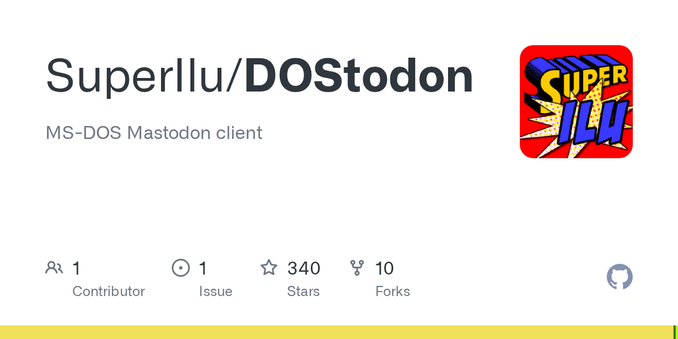I know there are many #DOS gamers here and those who simply love #retroComputing and #technology . But are there any serious DOS #programmers here as well? If so, in which language/s do you write? (I want to learn #QuickBasic , but I am at the very beginning, and it's not advanced enough for what I need.) Does anyone here work on the development of #FreeDOS ? Assuming any of the above is true, do any of you know about #accessibility and #ScreenReaders ? I am totally #blind and have loved DOS since I was a teenager. I am now forty-one. I am aware of the many updates to the system over the years, but have been unable to take advantage of them due to the fact that no new or updated #AdaptiveTechnology is being developed for it. Everyone seems to love Linux. I don't. Neither do I like Mac OS. I love Windows XP and 7, but 11 drives me mad. I think we deserve another alternative to all of these, and I also think that DOS can be it if a few things are added to it, including a talking installer, an updated screen reader and good software speech synthesis. For those of you who think DOS only equals dialup modems and floppies, you may wish to read this, or at least skim through it.
@dandylover1 I am both into the development of the #FreeDOS and #SvarDOS distributions. Development is mainly in C and X86 assembly
We have a "talking" version of our SvarDOS distribution for blind persons. It uses the PROVOX screen reader and requires a Braille 'n Speak synthesizer connected to the COM1 port.
I have never used this by myself, and I am not familiar with developing specifically for Braille 'n Speak. So I will ask the people involved about its state and report back. In the meantime, you may give it a try if you are interested.
You may get it at http://svardos.org/
@dandylover1 ESpeak sadly is neither in the FreeDOS software repository nor in the SvarDOS repository.
However, I downloaded its source code. There are traces of DOS support contained in the source. I am wondering if we could get this at least to compile. This does not mean it will run though.
I forwarded your reply to our discussion board at the SvarDOS website but will also report back here on mastodon. Link: http://svardos.org/?p=forum&thread=1757884070#1757885136
@dandylover1 I found out that ESpeak and ESpeak NG are different versions of the program. The latter does not seem to have any DOS support.
The original ESpeak has very limited functionallity under DOS. It can only produce wave files and phonemes for mbrola from its text input, but has no means to output by itself
Not sure if that is actually any useful to you. Mateusz Viste replied to me the following on our discussion board:
"Compiling espeak is not enough. Georgiana would like a screen reader that talks on its own, ie without TTS hardware. To achieve this, a TSR screen reader like Provox. ASAP, JAWS, etc would have to output speech instructions to espeak, and the latter would have to generate samples in realtime and feed them to a Sound Blaster. All this while the actual application is being operated by the user. Not a trivial feat."
So, currently, this sadly seems to be a dead end.
@dandylover1 @eniko
Hi there! You asked about programming languages. I always liked C for programming on DOS. My first programming language was BASIC and then FORTRAN 77 but C works very well.
We include compilers for all of those, and more. They are on the Bonus CD.
@dandylover1 The Watcom compiler chain is a very good place to go for C compilation to DOS, and it can handle both 16- and 32-bit modes.
If you have some other OS you use that has better accessibility support, Watcom will almost certainly run on it as well, so your preferred text editors or reference browsers should all be available to you.
If you do ultimately dip into assembly language, I've always preferred Nasm.
Beyond that, SuperIlu's list of tools above is a strict superset of mine.
@dandylover1
I started my career coding DOS programs and we used Microsoft C. As I recall there was a rudimentary dev environment that allowed you to step through your source code as it was executing which was handy.
Not well known at the time but in DOS you could simultaneously have both a VGA and a monochrome (Hercules) screen and the compiler would support the program output on one and the source code on the other.
Solid alternative: Borland Turbo C of the same era.
@dandylover1 There's @dec_hl around here - crafter of DOStodon - the Mastodon client for MS-DOS.
@jlsksr @dandylover1 As Julius pointed out, I do some DOS programming in my free time.
Mostly in plain C, but I have done FreeBASiC for fun, too. You might want to check it out…
My main project is DOjS, a JavaScript runtime for DOS, DOStodon is implemented using that.
@jlsksr @dandylover1 PS: I recently collected a list of development resources for MS DOS, maybe you find some interesting information there:
In DOjS there is a text mode editor for programming (which might be accessible, but I’m not sure), but if you run the program it will switch to graphics mode.
I have another project called jSH that has no embedded editor, but you can use it to create text mode programs in JavaScript.
This one is something like the “ugly” child of my projects as it doesn’t get as much love as it should 😆

